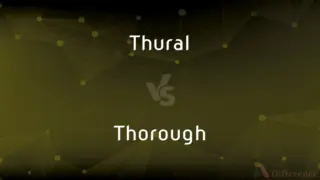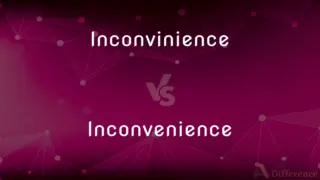Lillies vs. Lilies — Which is Correct Spelling?
Edited by Tayyaba Rehman — By Fiza Rafique — Updated on March 29, 2024
"Lillies" is an incorrect spelling of "lilies." Lilies are a type of flowering plant.

Table of Contents
Which is correct: Lillies or Lilies
How to spell Lilies?

Lillies
Incorrect Spelling

Lilies
Correct Spelling
ADVERTISEMENT
Key Differences
Think of the singular "lily" and just switch the "y" to "ies."
Remember, simpler is often correct – fewer letters in "lilies."
There's no double "l" in the middle of "lilies."
Recall the rule: change the "y" to "ies" for plurals of words ending in "y."
The word "lie" is in "lilies" but not "lillies."
ADVERTISEMENT
How Do You Spell Lilies Correctly?
Incorrect: Do lillies grow well in this type of soil?
Correct: Do lilies grow well in this type of soil?
Incorrect: The bouquet was filled with beautiful lillies.
Correct: The bouquet was filled with beautiful lilies.
Incorrect: He admired the array of lillies at the flower show.
Correct: He admired the array of lilies at the flower show.
Incorrect: She planted several lillies in her garden last spring.
Correct: She planted several lilies in her garden last spring.
Incorrect: She loves the scent of fresh lillies in the house.
Correct: She loves the scent of fresh lilies in the house.
Lilies Definitions
Flowers often used in bouquets and floral arrangements.
He surprised her with a bouquet of mixed lilies.
Plants from the genus Lilium.
Lilies can be toxic to cats.
Flowers symbolizing purity and refined beauty.
She wore a crown of white lilies at the wedding.
Flowering plants with large, often fragrant flowers.
The garden was adorned with vibrant lilies.
Perennial herbaceous plants grown from bulbs.
We planted lilies in the spring for summer blooms.
Any of various plants of the genus Lilium, having variously colored, often trumpet-shaped flowers.
Any of various similar or related plants, such as the daylily or the water lily.
The flower of any of these plants.
Plural of lily
Lilies Meaning in a Sentence
Water lilies float gracefully on the surface of ponds.
The garden was a riot of colors with lilies in full bloom.
Lilies can add a touch of elegance to any floral arrangement.
Planting lilies in a sunny spot ensures they grow tall and strong.
Lilies are often associated with peace and tranquility.
Lilies are one of the most popular flowers for bouquets.
Easter lilies symbolize purity and renewal.
Tiger lilies stand out for their vibrant orange petals and spots.
The symbolism of lilies varies across cultures, often representing fertility, purity, or rebirth.
Oriental lilies fill the evening air with their intoxicating fragrance.
Daylilies are hardy and easy to care for, making them perfect for beginner gardeners.
The festival featured a competition for the best-grown lilies.
Lilies have been a subject of art and literature throughout history due to their beauty and symbolism.
Calla lilies have a unique, elegant shape that makes them a favorite in wedding bouquets.
The greenhouse specializes in rare and exotic lilies.
She decided to plant lilies along the walkway for a welcoming entrance.
She received a beautiful bouquet of pink lilies for her birthday.
A pond with water lilies provides a habitat for a variety of wildlife.
Stargazer lilies are known for their striking appearance and sweet scent.
Lilies are toxic to cats, so pet owners need to be cautious when keeping them indoors.
The art class painted still life portraits of lilies.
Lilies Idioms & Phrases
To lie in the lilies
To live in a state of peace or contentment, often used poetically.
After retiring, she wanted nothing more than to lie in the lilies, free from stress.
Lilies of the field
Refers to a carefree or untroubled existence, taken from a biblical passage.
He lives like the lilies of the field, not worrying about tomorrow.
Common Curiosities
What is the pronunciation of lilies?
/ˈlɪliːz/
What is the verb form of lilies?
There isn't a verb form; "lilies" is a noun.
Which vowel is used before lilies?
The vowel "i."
What is the singular form of lilies?
Lily.
What is the root word of lilies?
The root word is "lily."
Which conjunction is used with lilies?
Standard conjunctions like "and" can be used.
Why is it called lilies?
It's the plural form of "lily," named for its beauty and purity symbols.
Is lilies an adverb?
No.
What is the plural form of lilies?
Lilies.
Which preposition is used with lilies?
"Of" as in "lilies of the valley."
Which article is used with lilies?
Either "the" or "some" depending on context.
Is the word lilies imperative?
No.
Is lilies a noun or adjective?
It's a noun.
Is lilies a negative or positive word?
Positive, often associated with beauty and purity.
Is lilies an abstract noun?
No.
How do we divide lilies into syllables?
Lil-ies.
What is a stressed syllable in lilies?
"Lil."
What is another term for lilies?
Blooms or flowers.
Which determiner is used with lilies?
"Those" or "these."
What is the second form of lilies?
N/A.
How is lilies used in a sentence?
"The pond was surrounded by fragrant lilies, creating a serene atmosphere."
Is lilies a vowel or consonant?
It's a word, containing both vowels and consonants.
Is lilies a collective noun?
No.
How many syllables are in lilies?
Two.
What part of speech is lilies?
Noun.
What is the opposite of lilies?
There isn't a direct opposite, but in some contexts, weeds could be considered as such.
What is the first form of lilies?
The word "lilies" doesn't have verb forms.
What is the third form of lilies?
N/A.
Is lilies a countable noun?
Yes.
Is the lilies term a metaphor?
It can be used metaphorically, such as "lilies of the field."
Share Your Discovery

Previous Comparison
Hundered vs. Hundred
Next Comparison
Aquaduct vs. AqueductAuthor Spotlight
Written by
Fiza RafiqueFiza Rafique is a skilled content writer at AskDifference.com, where she meticulously refines and enhances written pieces. Drawing from her vast editorial expertise, Fiza ensures clarity, accuracy, and precision in every article. Passionate about language, she continually seeks to elevate the quality of content for readers worldwide.
Edited by
Tayyaba RehmanTayyaba Rehman is a distinguished writer, currently serving as a primary contributor to askdifference.com. As a researcher in semantics and etymology, Tayyaba's passion for the complexity of languages and their distinctions has found a perfect home on the platform. Tayyaba delves into the intricacies of language, distinguishing between commonly confused words and phrases, thereby providing clarity for readers worldwide.











































